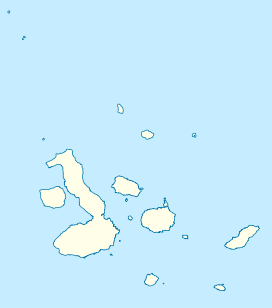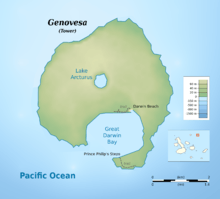Genovesa Island
| Genovesa Island | |
|---|---|
 Genovesa Island | |
| Highest point | |
| Elevation | 64 m (210 ft) |
| Prominence | 64 m (210 ft) |
| Coordinates | 0°19′00″N 89°57′00″W / 0.316667°N 89.95°WCoordinates: 0°19′00″N 89°57′00″W / 0.316667°N 89.95°W |
| Geography | |
| Location | Galápagos Islands, Ecuador |
| Geology | |
| Mountain type | Shield volcano |
| Last eruption | Unknown |
Genovesa Island, named after the Italian city of Genoa, in honor of Christopher Columbus, (referred to in English as Tower Island) is a shield volcano in the Galápagos Islands in the eastern Pacific Ocean. The island occupies about 14 square kilometres (5 sq mi), and its maximum elevation is 64 m (210 ft). The horse-shoe shaped island has a volcanic caldera whose wall has collapsed, forming the Great Darwin Bay, surrounded by cliffs. Lake Arcturus, filled with salt water, lies in the centre, and sediment within this crater lake is less than 6,000 years old. Although no historical eruptions are known from Genovesa, there are very young lava flows on the flanks of the volcano.

Wildlife
This island is known as Bird Island, because of the large and varied bird colonies which nest here. There are an abundance of frigatebirds and it is among the best place in the archipelago to see red-footed boobies, Nazca boobies, swallow-tailed gulls, storm petrels, tropicbirds, Darwin's finches, and Galápagos mockingbirds.
Prince Philip's Steps is an extraordinary steep path that leads through a seabird colony full of life, up to cliffs that are 25 metres (82 feet) high. At the top, the trail continues inland, passing more seabird colonies in a thin palo santo forest. The trail also provides overviews of a rocky plain. Storm petrels here are different from any others in the world because they are active during the day. To avoid predators, they only return to their nest holes at night.
The smallest marine iguana in the archipelago lives here.

Recreation
In Darwin Bay there is the possibility to either dive along the inner wall or go to the outer wall, which is less protected. Another possibility is to dive from the outside of the volcano through the channel into the caldera.